| Listing 1 - 10 of 23 | << page >> |
Sort by
|
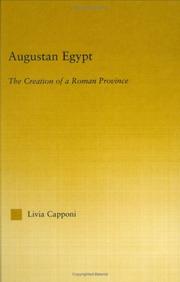
ISBN: 0203943945 1135873690 1135873682 9781135873684 9780203943946 9781135873691 9780415972178 0415972175 9780415512954 0415512956 9781135873646 113587364X Year: 2016 Publisher: London New York
Abstract | Keywords | Export | Availability | Bookmark
 Loading...
Loading...Choose an application
- Reference Manager
- EndNote
- RefWorks (Direct export to RefWorks)
Augustus, --- Octavius Caesar, --- Gaius Octavius, --- Octavius, Gaius, --- Octavianus, --- Octavianus, Gaius Julius Caesar, --- Gaius Julius Caesar Octavianus, --- Octavian, --- Caius Julius Caesar Octavianus, --- T︠S︡ezarʹ Oktavian Avgust, --- Oktavian-Avgust, T︠S︡ezarʹ, --- Avgust, T︠S︡ezarʹ Oktavian, --- Octavianus Augustus, --- Augusto, --- Cesarz August, --- Ogusṭus, --- Augustus Caesar, --- Gaius Octavius Thurinus, --- Octavio Augusto, --- Cayo Octavio Turino, --- Thurinus, Gaius Octavius, --- Turino, Cayo Octavio, --- אוגוסטוס --- Egypt --- History
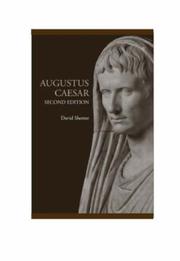
ISBN: 0203022882 1134364539 1280168749 9780203022887 9780415319355 0415319358 9780415319362 0415319366 9786610168743 6610168741 0415319358 0415319366 9781134364534 9781134364480 1134364482 9781134364527 1134364520 1566196671 9781566196673 9781280168741 Year: 2005 Publisher: London New York Routledge
Abstract | Keywords | Export | Availability | Bookmark
 Loading...
Loading...Choose an application
- Reference Manager
- EndNote
- RefWorks (Direct export to RefWorks)
History sees Augustus Caesar as the first emperor of Rome, whose system of ordered government provided a firm and stable basis for the successive expansion and prosperity of the Roman Empire over the next two centuries. Hailed as restorer of the Republic' and regarded by some as a deity in his own lifetime, Augustus became an object of emulation for many of his successors. This pamphlet reviews the evidence in order to place Augustus firmly in the context of his own times. It explores the background to his spectacular rise to power, his political and imperial reforms, and the creation of the Respublica of Augustus and the legacy left to his successors. By examining the hopes and expectations of his contemporaries and his own personal qualities of statesmanship and unscrupulous ambition, Shotter reveals that the reasons for Augustus' success lie partly in the complexity of the man himself, and partly in the unique nature of the times in which he lived.
Emperors --- Augustus, --- Octavius Caesar, --- Gaius Octavius, --- Octavius, Gaius, --- Octavianus, --- Octavianus, Gaius Julius Caesar, --- Gaius Julius Caesar Octavianus, --- Octavian, --- Caius Julius Caesar Octavianus, --- T︠S︡ezarʹ Oktavian Avgust, --- Oktavian-Avgust, T︠S︡ezarʹ, --- Avgust, T︠S︡ezarʹ Oktavian, --- Octavianus Augustus, --- Augusto, --- Cesarz August, --- Ogusṭus, --- Augustus Caesar, --- Gaius Octavius Thurinus, --- Octavio Augusto, --- Cayo Octavio Turino, --- Thurinus, Gaius Octavius, --- Turino, Cayo Octavio, --- אוגוסטוס --- Rome --- History
Multi
ISBN: 9780521767972 9780521744423 0521767970 0521744423 9781139045575 1139507885 1107225167 1139517414 9786613685438 1139045571 1139514849 1139513915 1139516493 1139518348 1280775041 9781139518345 9781139514842 9781139516495 9781139514842 9781139507882 9781107225169 9781280775048 6613685437 9781139517416 9781139513913 Year: 2012 Publisher: Cambridge Cambridge University Press
Abstract | Keywords | Export | Availability | Bookmark
 Loading...
Loading...Choose an application
- Reference Manager
- EndNote
- RefWorks (Direct export to RefWorks)
Augustus, Rome's first emperor, is one of the great figures of world history and one of the most fascinating. In this lively and concise biography Karl Galinsky examines Augustus' life from childhood to deification. He chronicles the mosaic of vicissitudes, challenges, setbacks and successes that shaped Augustus' life, both public and private. How did he use his power? How did he manage to keep re-inventing himself? What kind of man was he? A transformative leader, Augustus engineered profound change in Rome and throughout the Mediterranean world. No one would have expected such vast achievements from the frail and little-known eighteen-year-old who became Caesar's heir amid turmoil and crisis. A mere thirteen years later, after defeating Antony and Cleopatra, he had, in his words, 'power over all things'.
Augustus [Roman emperor] --- Emperors --- Empereurs --- Biography. --- Biographies --- Augustus, --- Rome --- History --- Politics and government --- Histoire --- Politique et gouvernement --- Octavius Caesar, --- Gaius Octavius, --- Octavius, Gaius, --- Octavianus, --- Octavianus, Gaius Julius Caesar, --- Gaius Julius Caesar Octavianus, --- Octavian, --- Caius Julius Caesar Octavianus, --- T︠S︡ezarʹ Oktavian Avgust, --- Oktavian-Avgust, T︠S︡ezarʹ, --- Avgust, T︠S︡ezarʹ Oktavian, --- Octavianus Augustus, --- Augusto, --- Cesarz August, --- Ogusṭus, --- Augustus Caesar, --- Gaius Octavius Thurinus, --- Octavio Augusto, --- Cayo Octavio Turino, --- Thurinus, Gaius Octavius, --- Turino, Cayo Octavio, --- אוגוסטוס --- Arts and Humanities
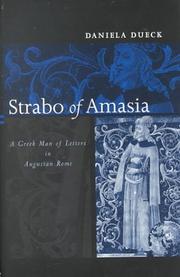
ISBN: 1134605617 1280069554 0585449279 0203462181 9780203462188 9780415216722 0415216729 9780585449272 0415216729 9781134605613 9781134605569 1134605560 9781134605606 1134605609 9780415620178 0415620171 9786610069552 6610069557 Year: 2000 Publisher: London New York Routlege
Abstract | Keywords | Export | Availability | Bookmark
 Loading...
Loading...Choose an application
- Reference Manager
- EndNote
- RefWorks (Direct export to RefWorks)
Strabo of Amasia offers an intellectual biography of Strabo, a Greek man of letters, set against the political and cultural background of Augustan Rome. It offers the first full-scale interpretation of the man and his life in English. It emphasises the place and importance of Strabo's Geography and of geography itself within these intellectual circles. It argues for a deeper understanding of the fusion of Greek and Roman elements in the culture of the Roman Empire. Though he wrote in Greek, Strabo must be regarded as an 'Augustan' writer like Virgil or Livy.
Geographers --- Geography, Ancient. --- Ancient geography --- Geography --- Earth scientists --- Strabo. --- Augustus, --- Octavius Caesar, --- Gaius Octavius, --- Octavius, Gaius, --- Octavianus, --- Octavianus, Gaius Julius Caesar, --- Gaius Julius Caesar Octavianus, --- Octavian, --- Caius Julius Caesar Octavianus, --- T︠S︡ezarʹ Oktavian Avgust, --- Oktavian-Avgust, T︠S︡ezarʹ, --- Avgust, T︠S︡ezarʹ Oktavian, --- Octavianus Augustus, --- Augusto, --- Cesarz August, --- Ogusṭus, --- Augustus Caesar, --- Gaius Octavius Thurinus, --- Octavio Augusto, --- Cayo Octavio Turino, --- Thurinus, Gaius Octavius, --- Turino, Cayo Octavio, --- אוגוסטוס --- Strabon --- Influence. --- Rome --- History --- Geographers - Italy - Rome - Biography.
Book
ISBN: 1611173361 9781611173369 1299852017 9781299852013 1611172772 9781611172775 Year: 2013 Publisher: Columbia, South Carolina : Published by the University of South Carolina Press,
Abstract | Keywords | Export | Availability | Bookmark
 Loading...
Loading...Choose an application
- Reference Manager
- EndNote
- RefWorks (Direct export to RefWorks)
In A City of Marble, Kathleen Lamp argues that classical rhetorical theory shaped the Augustan cultural campaigns and that in turn the Augustan cultural campaigns functioned rhetorically to help Augustus gain and maintain power and to influence civic identity and participation in the Roman Principate (27 b. c. e.-14 c. e.).Lamp begins by studying rhetorical treatises, those texts most familiar to scholars of rhetoric, and moves on to those most obviously using rhetorical techniques in visual form. She then arrives at those objects least recognizable as rhetorical artifacts, but perhaps most si
Latin literature --- Rhetoric, Ancient. --- Ancient rhetoric --- Classical languages --- Greek language --- Greek rhetoric --- Latin language --- Latin rhetoric --- History and criticism. --- Rhetoric --- Augustus, --- Octavius Caesar, --- Gaius Octavius, --- Octavius, Gaius, --- Octavianus, --- Octavianus, Gaius Julius Caesar, --- Gaius Julius Caesar Octavianus, --- Octavian, --- Caius Julius Caesar Octavianus, --- T︠S︡ezarʹ Oktavian Avgust, --- Oktavian-Avgust, T︠S︡ezarʹ, --- Avgust, T︠S︡ezarʹ Oktavian, --- Octavianus Augustus, --- Augusto, --- Cesarz August, --- Ogusṭus, --- Augustus Caesar, --- Gaius Octavius Thurinus, --- Octavio Augusto, --- Cayo Octavio Turino, --- Thurinus, Gaius Octavius, --- Turino, Cayo Octavio, --- אוגוסטוס
Book
ISBN: 3796534694 Year: 2015 Publisher: Basel Schwabe Verlag
Abstract | Keywords | Export | Availability | Bookmark
 Loading...
Loading...Choose an application
- Reference Manager
- EndNote
- RefWorks (Direct export to RefWorks)
This book’s presentation of the republican Roman institutions and their history enables the reader to clearly distinguish between what we know from ancient sources and the contemporary knowledge based on modern research. The main goal consists in first presenting the well-documented Roman institutions of the last centuries of the Republic and then analysing the reliability of the ancient sources which deal with the origins of these institutions since the foundation of Rome.
Public institutions --- Augustus, --- Government institutions --- Institutions, Public --- Institutions, State --- State institutions --- Associations, institutions, etc. --- Octavius Caesar, --- Gaius Octavius, --- Octavius, Gaius, --- Octavianus, --- Octavianus, Gaius Julius Caesar, --- Gaius Julius Caesar Octavianus, --- Octavian, --- Caius Julius Caesar Octavianus, --- T︠S︡ezarʹ Oktavian Avgust, --- Oktavian-Avgust, T︠S︡ezarʹ, --- Avgust, T︠S︡ezarʹ Oktavian, --- Octavianus Augustus, --- Augusto, --- Cesarz August, --- Ogusṭus, --- Augustus Caesar, --- Gaius Octavius Thurinus, --- Octavio Augusto, --- Cayo Octavio Turino, --- Thurinus, Gaius Octavius, --- Turino, Cayo Octavio, --- אוגוסטוס --- Rome --- Politics and government --- History --- Ancient studies --- antiquity --- Roman republic --- Augustus --- history of Rome --- Roman empire --- Institutions
Book
ISBN: 9781107188785 1107188784 9781316986677 9781316638606 1108100090 1108102891 1108103294 1108104908 1316986675 1108103707 1108102492 131663860X Year: 2017 Publisher: Cambridge Cambridge University Press
Abstract | Keywords | Export | Availability | Bookmark
 Loading...
Loading...Choose an application
- Reference Manager
- EndNote
- RefWorks (Direct export to RefWorks)
From archaic Sparta to classical Athens the chorus was a pervasive feature of Greek social and cultural life. Until now, however, its reception in Roman literature and culture has been little appreciated. This book examines how the chorus is reimagined in a brief but crucial period in the history of Latin literature, the early Augustan period from 30 to 10 BCE. It argues that in the work of Horace, Virgil, and Propertius, the language and imagery of the chorus articulate some of their most pressing concerns surrounding social and literary belonging in a rapidly changing Roman world. By re-examining seminal Roman texts such as Horace's Odes and Virgil's Aeneid from this fresh perspective, the book connects the history of musical culture with Augustan poetry's interrogation of fundamental questions surrounding the relationship between individual and community, poet and audience, performance and writing, Greek and Roman, and tradition and innovation.
Latin poetry --- Drama --- Music and literature --- Poetry --- Literature and society --- History and criticism. --- Chorus. --- Social aspects --- History. --- Augustus, --- Influence. --- Chorus (Drama) --- History and criticism --- Chorus --- Octavius Caesar, --- Gaius Octavius, --- Octavius, Gaius, --- Octavianus, --- Octavianus, Gaius Julius Caesar, --- Gaius Julius Caesar Octavianus, --- Octavian, --- Caius Julius Caesar Octavianus, --- T︠S︡ezarʹ Oktavian Avgust, --- Oktavian-Avgust, T︠S︡ezarʹ, --- Avgust, T︠S︡ezarʹ Oktavian, --- Octavianus Augustus, --- Augusto, --- Cesarz August, --- Ogusṭus, --- Augustus Caesar, --- Gaius Octavius Thurinus, --- Octavio Augusto, --- Cayo Octavio Turino, --- Thurinus, Gaius Octavius, --- Turino, Cayo Octavio, --- אוגוסטוס --- E-books
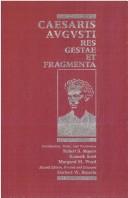
ISBN: 0814336566 9780814336564 0814321372 9780814321379 0814321380 9780814321386 Year: 1990 Publisher: Detroit Wayne State University Press
Abstract | Keywords | Export | Availability | Bookmark
 Loading...
Loading...Choose an application
- Reference Manager
- EndNote
- RefWorks (Direct export to RefWorks)
Latin language --- Readers --- History. --- Augustus, --- Rome --- Rim --- Roman Empire --- Roman Republic (510-30 B.C.) --- Romi (Empire) --- Byzantine Empire --- Rome (Italy) --- History --- Problems, exercises, etc. --- Octavius Caesar, --- Gaius Octavius, --- Octavius, Gaius, --- Octavianus, --- Octavianus, Gaius Julius Caesar, --- Gaius Julius Caesar Octavianus, --- Octavian, --- Caius Julius Caesar Octavianus, --- T︠S︡ezarʹ Oktavian Avgust, --- Oktavian-Avgust, T︠S︡ezarʹ, --- Avgust, T︠S︡ezarʹ Oktavian, --- Octavianus Augustus, --- Augusto, --- Cesarz August, --- Ogusṭus, --- Augustus Caesar, --- Gaius Octavius Thurinus, --- Octavio Augusto, --- Cayo Octavio Turino, --- Thurinus, Gaius Octavius, --- Turino, Cayo Octavio, --- אוגוסטוס
Book
ISBN: 0813161959 9780813161952 1322601518 9781322601519 081315099X 9780813150994 Year: 2015 Publisher: Lexington The University Press of Kentucky
Abstract | Keywords | Export | Availability | Bookmark
 Loading...
Loading...Choose an application
- Reference Manager
- EndNote
- RefWorks (Direct export to RefWorks)
The almost universal adulation given Edmund Waller in the late seventeenth and early eighteenth centuries -- an adulation which, often as not, attached to his reform of poetry -- has been commonly accepted with little question of the grounds on which it is based. In this essay Alexander Ward Allison presents for the first time a specific analysis of the changes from Jacobean modes which Waller made, suggesting in the course of his analysis that the seventeenth century saw not a dissociation of sensibility, but rather a new fusion, of which Waller is a type.By a careful and detailed reading of
English poetry --- Roman influences. --- History and criticism. --- Augustus, --- Waller, Edmund, --- Octavius Caesar, --- Gaius Octavius, --- Octavius, Gaius, --- Octavianus, --- Octavianus, Gaius Julius Caesar, --- Gaius Julius Caesar Octavianus, --- Octavian, --- Caius Julius Caesar Octavianus, --- T︠S︡ezarʹ Oktavian Avgust, --- Oktavian-Avgust, T︠S︡ezarʹ, --- Avgust, T︠S︡ezarʹ Oktavian, --- Octavianus Augustus, --- Augusto, --- Cesarz August, --- Ogusṭus, --- Augustus Caesar, --- Gaius Octavius Thurinus, --- Octavio Augusto, --- Cayo Octavio Turino, --- Thurinus, Gaius Octavius, --- Turino, Cayo Octavio, --- אוגוסטוס --- E. W. --- W., E. --- Gentleman that loves the peace, --- Waller, Edmond, --- Waller, --- True son of the Church of England and a lover of his countries liberty --- Influence.
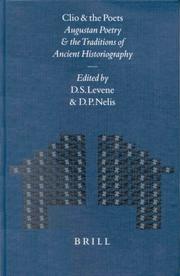
ISBN: 9004117822 9786610464357 1417536594 1280464356 9047400496 9781417536597 9789047400493 9789004117822 6610464359 9781280464355 Year: 2002 Volume: 224 Publisher: Leiden Brill
Abstract | Keywords | Export | Availability | Bookmark
 Loading...
Loading...Choose an application
- Reference Manager
- EndNote
- RefWorks (Direct export to RefWorks)
The Augustan age was one in which writers were constantly reworking the Roman past, and which was marked by a profound engagement of poets with the historians and historical techniques which were the main vehicle for the transmission of the image of the past to their day. In this book seventeen leading scholars from Europe and America examine the fascinating interaction between such apparently diverse genres: how the Augustan poets drew on — or reacted against — the historians’ presentation of the world, and how, conversely, historians picked up and transformed poetic themes for their own ends. With essays on poems from Horace’s Odes to Ovid’s Metamorphoses , on authors from Virgil to Valerius Maximus, it forms the most important topic so central to such a particulary relevant period of literary history.
Historical poetry, Latin --- History, Ancient --- Literature and history --- History and criticism --- Historiography --- -History, Ancient --- -Literature and history --- -History and literature --- History and poetry --- Poetry and history --- History --- Ancient history --- Ancient world history --- World history --- Latin historical poetry --- Latin poetry --- Augustus Emperor of Rome --- -Influence --- Rome --- -Historical poetry, Latin --- Poésie latine --- Histoire ancienne --- Histoire et critique --- Historiographie --- History and literature --- Augustus, --- Octavius Caesar, --- Gaius Octavius, --- Octavius, Gaius, --- Octavianus, --- Octavianus, Gaius Julius Caesar, --- Gaius Julius Caesar Octavianus, --- Octavian, --- Caius Julius Caesar Octavianus, --- T︠S︡ezarʹ Oktavian Avgust, --- Oktavian-Avgust, T︠S︡ezarʹ, --- Avgust, T︠S︡ezarʹ Oktavian, --- Octavianus Augustus, --- Augusto, --- Cesarz August, --- Ogusṭus, --- Augustus Caesar, --- Gaius Octavius Thurinus, --- Octavio Augusto, --- Cayo Octavio Turino, --- Thurinus, Gaius Octavius, --- Turino, Cayo Octavio, --- אוגוסטוס --- Influence --- Rim --- Roman Empire --- Roman Republic (510-30 B.C.) --- Romi (Empire) --- Byzantine Empire --- Rome (Italy)
| Listing 1 - 10 of 23 | << page >> |
Sort by
|

 Search
Search Feedback
Feedback About UniCat
About UniCat  Help
Help News
News